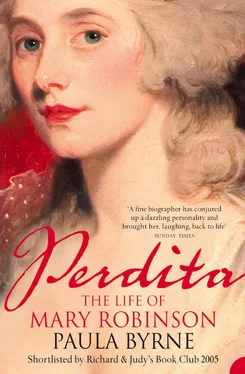By the end of the century Hannah More had turned herself into one of the most formidable conservative propagandists of the age. She deeply resented her connection with her old pupil, the infamous Perdita. That one of the most reviled women of the era was taught by one of the most revered was an irony not lost on the bluestocking Mrs Thrale: ‘Of all Biographical Anecdotes none ever struck me more forcibly than the one saying how Hannah More la Dévote was the person who educated fair Perdita la Pécheresse .’ 14 Mary, in turn, made it abundantly clear that her literary gifts owed little debt to Hannah and her sisters. She stressed that the education she received from the school was merely in feminine accomplishments of the sort that were required for the marriage market. Women were expected to be ornaments to society and, once married, to be modest and retiring creatures confined to the domestic sphere rather than competing with men in the public domain.
As the daughter of a prosperous merchant, Mary benefited from the privileges that could be bought by new money. The distinguished musician Edmund Broderip taught her music on an expensive Kirkman harpsichord bought by her father. The family moved to a larger, more elegant house as Nicholas Darby, keen to show off the fruits of his upward mobility, insisted upon living like a gentleman, buying expensive plate, sumptuous silk furniture, foreign wine, and luxurious food, displaying ‘that warm hospitality which is often the characteristic of a British merchant’. 15 He ensured that his daughter lived in the best style. Her bed was of the richest crimson damask; her dresses, ordered from London, were of the finest cambric. The family spent the summer months on gentrified Clifton Hill in order to benefit from the clearer air. Darby’s appetite for ‘the good things of the world’ would be inherited by his daughter.
Mrs Darby, meanwhile, provided emotional security. Unlike many of the other girls at the More sisters’ school, Mary never boarded: she did not ‘pass a night of separation from the fondest of mothers’. In retrospect, she considered herself overindulged, suggesting that her mother’s only fault was ‘a too tender care’, a tendency to spoil and flatter her children: ‘the darlings of her bosom were dressed, waited on, watched, and indulged with a degree of fondness bordering on folly’. 16 Given that Nicholas Darby was absent abroad for much of the time, it is not surprising that Hester threw so much into her children. Mary implies that an absent father and an indulgent mother proved a dangerous combination for a headstrong girl like herself.
The Memoirs paints a picture of Mary’s early childhood as a fairy-tale existence, a paradise lost. Her life changed for ever, she says, when she was in her ninth year. Nicholas Darby had a lifelong history of travelling, fishing, and trading in the far north of Newfoundland. In the early 1760s he was acting as spokesman for the Society of Merchant Venturers, advising the Government on the defence of Newfoundland, which was a key strategic outpost fought over by the British and French during the Seven Years War. Then in 1765 he became obsessed with what Mary describes as an ‘eccentric’ plan, a scheme ‘as wild and romantic as it was perilous to hazard, which was no less than that of establishing a whale fishery on the coast of Labrador; and of civilizing the Esquimaux Indians, in order to employ them in the extensive undertaking’. 17
This was dangerous territory. Not only was the weather extremely inclement, but the area in question – the Strait of Belle Isle – had only been held in British hands for a couple of years. But Darby had some powerful backers: Mary records that his scheme was given approval by the Governor of Newfoundland, Lord Chatham (William Pitt the Elder) and ‘several equally distinguished personages’. The venture seemed ‘full of promise’. Darby dreamed that the day might come when, thanks to him, British America could rival the whale industry of Greenland.
Having got permission from the Government, he told his family that the scheme would require his full-time residence in America for a minimum of two years. Hester was appalled by the idea. The northern wastes were no place for children, so accompanying her husband would have meant leaving her beloved sons and daughter to complete their education at boarding schools in England. She also had a phobia of the ocean. The decision to stay with her children would cost Hester her marriage. Nicholas duly sailed for America. The eldest boy John was placed in a mercantile house at Leghorn, whilst Mary, William, and George stayed with Hester in Bristol.
At first, Nicholas wrote regularly and affectionately. But his letters gradually became less frequent, and when they did arrive they began to seem dutiful and perfunctory. Then there was a long period of silence. And finally ‘the dreadful secret was unfolded’: Darby had acquired a mistress, Elenor, who, as Mary wryly testified, was only too happy to ‘brave the stormy ocean’ alongside him. She ‘consented to remain two years with him in the frozen wilds of America’. 18
Darby had sailed from England to Chateau Bay with 150 men. He was then given headquarters on Cape Charles, where he constructed lodgings, a workshop, and a landing stage. Fishing began well, but then the local Inuit burned his boats and destroyed his crucial supply of salt. His men fought with each other and refused to winter on the coast. He made a second attempt a year later, in partnership with a fellow merchant, returning with new men and more sophisticated equipment. But more fighting ensued and in the summer of 1767 ten men were arrested on murder charges. Then in November, around the time of Mary’s tenth birthday, the Labrador project came to a violent end: another band of Inuit attacked a crew preparing for winter sealing, killed three men, burned Darby’s settlement, and set his boats adrift. Thousands of pounds’ worth of ships and equipment were destroyed. ‘The island of promise’ had turned into a ‘scene of barbarous desolation’ – though Mary’s account characteristically exaggerates the slaughter, turning the three casualties into the murder of ‘many of his people’. 19 Darby’s patrons refused to honour their promise of financial protection and, with more losses incurred, he dissolved his partnership and set in train the sale of the family home.
Back in Bristol, Hester Darby faced a series of calamities: the shame that came with the news that her husband was residing in America with his mistress, the financial losses that would cost her everything, and the death – from smallpox or possibly measles – of Mary’s 6-year-old brother William. On his return to London, Nicholas lived with his mistress Elenor, but the manuscript of Mary’s Memoirs has an intriguing memorandum, excluded from the published text: ‘Esquemaux Indians brought over by my father, a woman and a boy.’ 20 Could this have been another mistress? And could it then be that Mary had an illegitimate half-Inuit half-brother?
Mary always felt torn between pride in her father’s achievements and resentment at his abandonment of the family. Her ambivalence can be seen in the way that she emphasizes his dual nationality. When she speaks of his bold and restless spirit, and his love of sea life, she ascribes this to his status as an American seafarer, yet at other times he is that stalwart of the community, a ‘British merchant’. Mary blamed her father’s mistress for bewitching his senses at a time when he was isolated in America, away from his wife and family. She herself learnt a valuable lesson at a particularly vulnerable age: loss of fortune and position swiftly loses friends. Dropped by the people who had been happy to take advantage of their former prosperity, the family were left bereft.
Читать дальше












